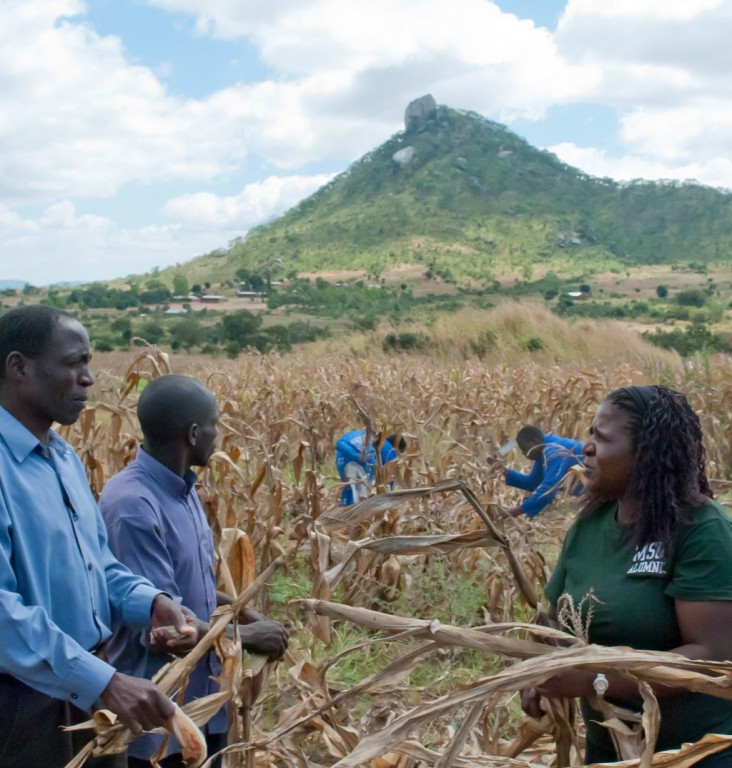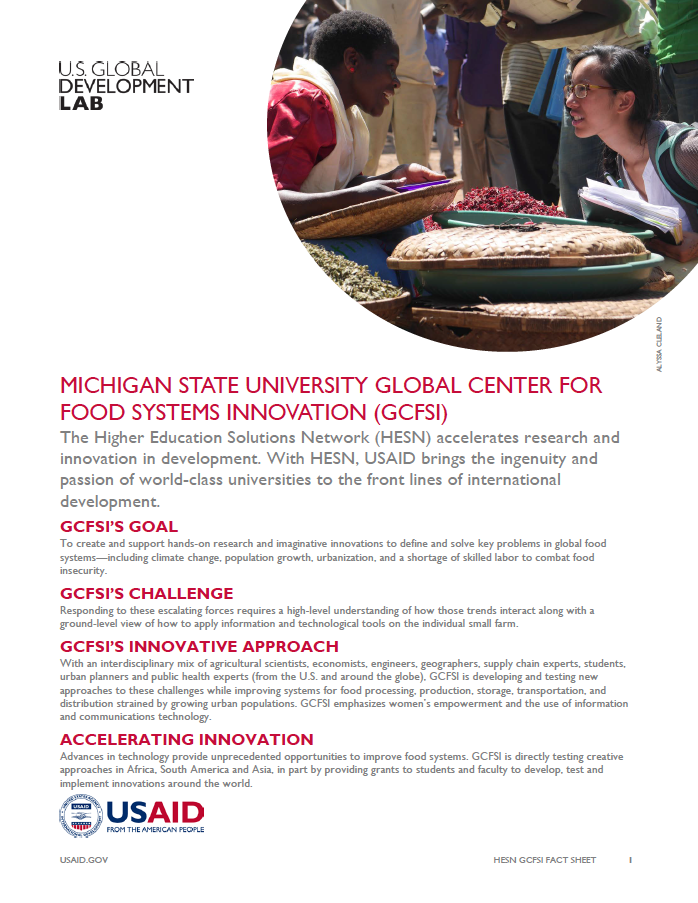- What We Do
- Agriculture and Food Security
- Democracy, Human Rights and Governance
- Economic Growth and Trade
- Education
- Ending Extreme Poverty
- Environment and Global Climate Change
- Gender Equality and Women's Empowerment
- Global Health
- Water and Sanitation
- Working in Crises and Conflict
- U.S. Global Development Lab

GCFSI's Goal
To create and support hands-on research and imaginative innovations to define and solve key problems in global food systems—including climate change, population growth, urbanization, and a shortage of skilled labor to combat food insecurity.
GCFSI's Challenge
Responding to these escalating forces requires a high-level understanding of how those trends interact along with a ground-level view of how to apply information and technological tools on the individual small farm.
GCFSI's Innovative Approach
With an interdisciplinary mix of agricultural scientists, economists, engineers, geographers, supply chain experts, students, urban planners and public health experts (from the U.S. and around the globe), GCFSI is developing and testing new approaches to these challenges while improving systems for food processing, production, storage, transportation, and distribution strained by growing urban populations. GCFSI emphasizes women’s empowerment and the use of information and communications technology.
Accelerating Innovation
Advances in technology provide unprecedented opportunities to improve food systems. GCFSI is directly testing creative approaches in Africa, South America and Asia, in part by providing grants to students and faculty to develop, test and implement innovations around the world.
In Malawi, GCFSI operates an innovation hub, in concert with the Lilongwe University of Agriculture and Natural Resources (LUANAR), implementing projects to support innovations in food systems. The hub is a practical lab where LUANAR faculty can test innovative ideas that support food security. One hub activity is encouraging the cultivation of multipurpose legumes such as pigeon pea that enrich degraded soil, increase market opportunities, and provide a vital source of nutrition. Different teams analyzed the demand for legumes, the level of workforce skills, and how social norms shape women’s and men’s roles and power in legume production, processing, and marketing. Another team experimented with use of participatory video-making to communicate the benefits of multipurpose legumes to smallholder farmers, especially women. The long-term goal is that the lab will become an engine to test and scale up innovations throughout local and regional food systems in and around Malawi.
Additional projects at the LUANAR Innovation Hub include the following:
- Training LUANAR faculty to exercise their “innovation muscles” via design thinking through the Innovation Scholars Program.
- Strengthening the capacity of LUANAR faculty to “translate” their research into language that is readily understood by Malawian farmers and government and private sector decision makers.
- Creating an innovation ecosystem at LUANAR by equipping LUANAR administrators and faculty members with examples of regional innovation and new organizational change models.
GCFSI provides grants that support innovations in different phases of their development: early stage, testing and evaluation, and scale-up. Through grants to faculty members, GCFSI has supported diverse creative approaches including the following:
- Harnessed “Big Data” and inexpensive sensors to create an open platform where scientists from around the world can collaborate on issues of plant and soil health.
- Created a mobile phone-based knowledge network of honey producers in East Africa.
- Developed a low carbon footprint and low cost cool storage technology for vegetable farmers in India.
- Used text messages and social networks to help female entrepreneurs produce sweet potatoes in Tanzania.
- Developed a human-powered bean thresher for small-scale processing in Zambia.
Through grants to students, GCFSI is supporting the following innovations:
- Animal feed derived from algae, which results in lower carbon dioxide emissions.
- In East Africa, a hydroponic garden to provide fresh food in urban settings; insect-based food products for people and livestock; and a digital platform to share information on “climate change-smart” agriculture.
- In Nepal, a rope and pulley-based system that moves produce and goods up and down mountainsides.
- In Uganda, household biogas generators that use manure for lighting and cooking, conserving trees.
Student Engagement and Sharing Knowledge
GCFSI involves students in problem solving through study abroad scholarships and internships with partner organizations. In a “field practicum” course, students travel to Malawi for two weeks and collaborate with LUANAR students and local entrepreneurs to design cost-effective solutions to problems in urban markets. To share knowledge and build capacity in food systems innovation, GCFSI holds webinars, expert meetings, and workshops in the U.S. and developing countries.
Partners
Michigan State University; CRDF Global; The Energy and Resources Institute in New Delhi, India; Lilongwe University of Agriculture and Natural Resources in Malawi; and Wageningen University and Research Center, the Netherlands.
For more information
www.gcfsi.isp.msu.edu • https://twitter.com/GCFSI • facebook.com/GlobalCenterforFoodSystemsInnovationsGCFSI
The Higher Education Solutions Network (HESN) accelerates research and innovation in development. With HESN, USAID brings the ingenuity and passion of world-class universities to the front lines of international development. Since 2012, HESN has supported Development Labs at seven universities that engage students, researchers, faculty, and their partners in innovating scientific and technological approaches to the world's most challenging development problems. By evaluating and field-testing approaches in partnership with local institutions, HESN Development Labs identify solutions that are efficient, cost-effective, accessible, and sustainable, then strategize how to apply them on a large scale. With funding over five years from USAID and matching investments from the universities, the HESN network has grown into a vibrant collaboration among more than 650 partner institutions in academia, civil society, and government in more than 65 countries.








Comment
Make a general inquiry or suggest an improvement.